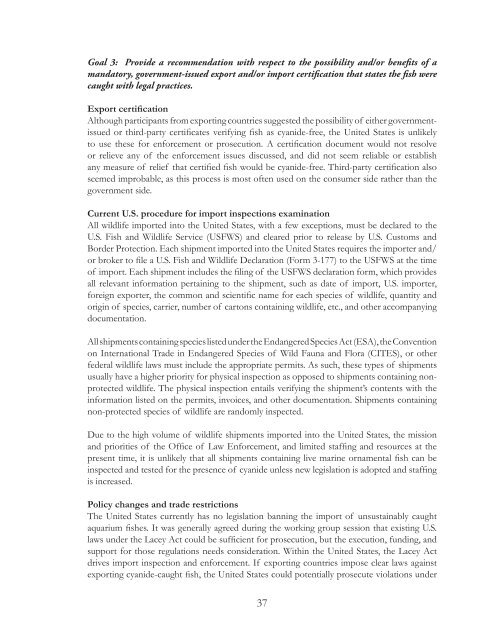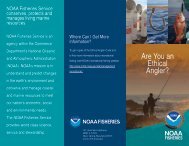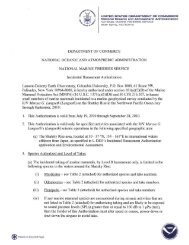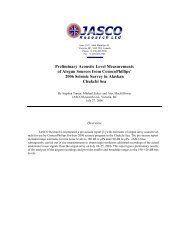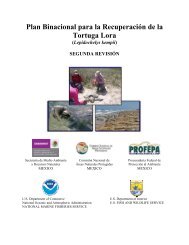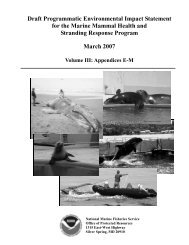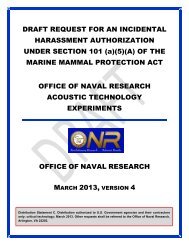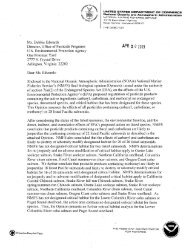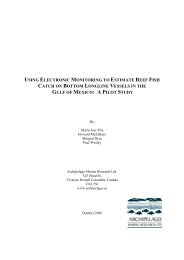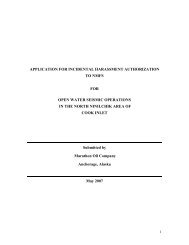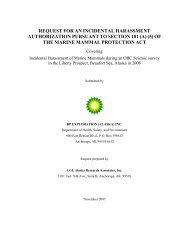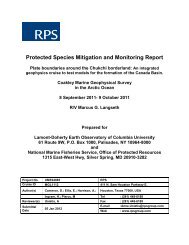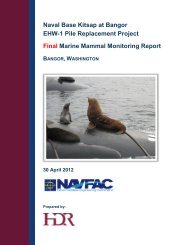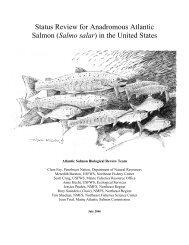Proceedings of the International Cyanide Detection Testing Workshop
Proceedings of the International Cyanide Detection Testing Workshop
Proceedings of the International Cyanide Detection Testing Workshop
Create successful ePaper yourself
Turn your PDF publications into a flip-book with our unique Google optimized e-Paper software.
Goal 3: Provide a recommendation with respect to <strong>the</strong> possibility and/or benefi ts <strong>of</strong> a<br />
mandatory, government-issued export and/or import certifi cation that states <strong>the</strong> fi sh were<br />
caught with legal practices.<br />
Export certifi cation<br />
Although participants from exporting countries suggested <strong>the</strong> possibility <strong>of</strong> ei<strong>the</strong>r governmentissued<br />
or third-party certifi cates verifying fi sh as cyanide-free, <strong>the</strong> United States is unlikely<br />
to use <strong>the</strong>se for enforcement or prosecution. A certifi cation document would not resolve<br />
or relieve any <strong>of</strong> <strong>the</strong> enforcement issues discussed, and did not seem reliable or establish<br />
any measure <strong>of</strong> relief that certifi ed fi sh would be cyanide-free. Third-party certifi cation also<br />
seemed improbable, as this process is most <strong>of</strong>ten used on <strong>the</strong> consumer side ra<strong>the</strong>r than <strong>the</strong><br />
government side.<br />
Current U.S. procedure for import inspections examination<br />
All wildlife imported into <strong>the</strong> United States, with a few exceptions, must be declared to <strong>the</strong><br />
U.S. Fish and Wildlife Service (USFWS) and cleared prior to release by U.S. Customs and<br />
Border Protection. Each shipment imported into <strong>the</strong> United States requires <strong>the</strong> importer and/<br />
or broker to fi le a U.S. Fish and Wildlife Declaration (Form 3-177) to <strong>the</strong> USFWS at <strong>the</strong> time<br />
<strong>of</strong> import. Each shipment includes <strong>the</strong> fi ling <strong>of</strong> <strong>the</strong> USFWS declaration form, which provides<br />
all relevant information pertaining to <strong>the</strong> shipment, such as date <strong>of</strong> import, U.S. importer,<br />
foreign exporter, <strong>the</strong> common and scientifi c name for each species <strong>of</strong> wildlife, quantity and<br />
origin <strong>of</strong> species, carrier, number <strong>of</strong> cartons containing wildlife, etc., and o<strong>the</strong>r accompanying<br />
documentation.<br />
All shipments containing species listed under <strong>the</strong> Endangered Species Act (ESA), <strong>the</strong> Convention<br />
on <strong>International</strong> Trade in Endangered Species <strong>of</strong> Wild Fauna and Flora (CITES), or o<strong>the</strong>r<br />
federal wildlife laws must include <strong>the</strong> appropriate permits. As such, <strong>the</strong>se types <strong>of</strong> shipments<br />
usually have a higher priority for physical inspection as opposed to shipments containing nonprotected<br />
wildlife. The physical inspection entails verifying <strong>the</strong> shipment’s contents with <strong>the</strong><br />
information listed on <strong>the</strong> permits, invoices, and o<strong>the</strong>r documentation. Shipments containing<br />
non-protected species <strong>of</strong> wildlife are randomly inspected.<br />
Due to <strong>the</strong> high volume <strong>of</strong> wildlife shipments imported into <strong>the</strong> United States, <strong>the</strong> mission<br />
and priorities <strong>of</strong> <strong>the</strong> Offi ce <strong>of</strong> Law Enforcement, and limited staffi ng and resources at <strong>the</strong><br />
present time, it is unlikely that all shipments containing live marine ornamental fi sh can be<br />
inspected and tested for <strong>the</strong> presence <strong>of</strong> cyanide unless new legislation is adopted and staffi ng<br />
is increased.<br />
Policy changes and trade restrictions<br />
The United States currently has no legislation banning <strong>the</strong> import <strong>of</strong> unsustainably caught<br />
aquarium fi shes. It was generally agreed during <strong>the</strong> working group session that existing U.S.<br />
laws under <strong>the</strong> Lacey Act could be suffi cient for prosecution, but <strong>the</strong> execution, funding, and<br />
support for those regulations needs consideration. Within <strong>the</strong> United States, <strong>the</strong> Lacey Act<br />
drives import inspection and enforcement. If exporting countries impose clear laws against<br />
exporting cyanide-caught fi sh, <strong>the</strong> United States could potentially prosecute violations under<br />
37


